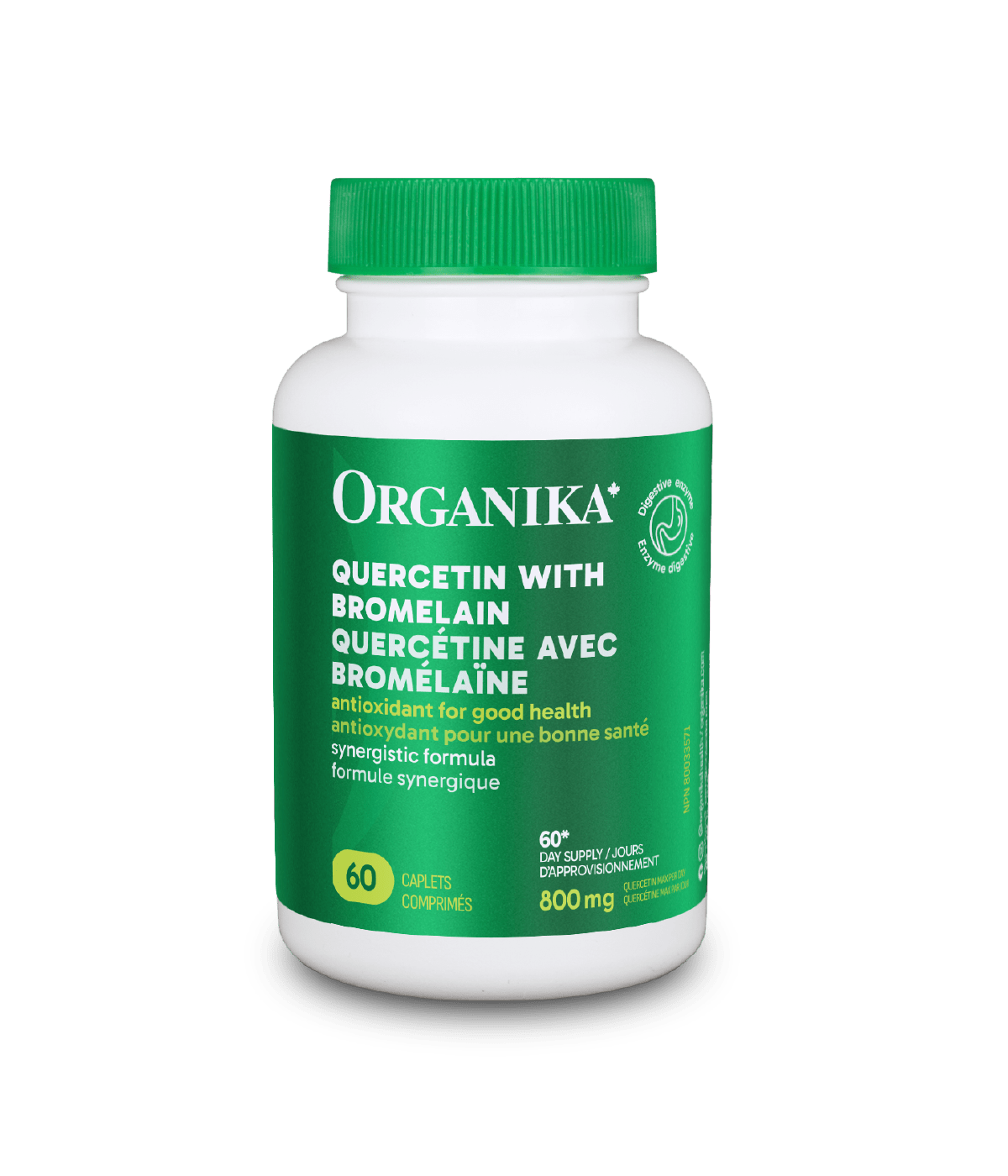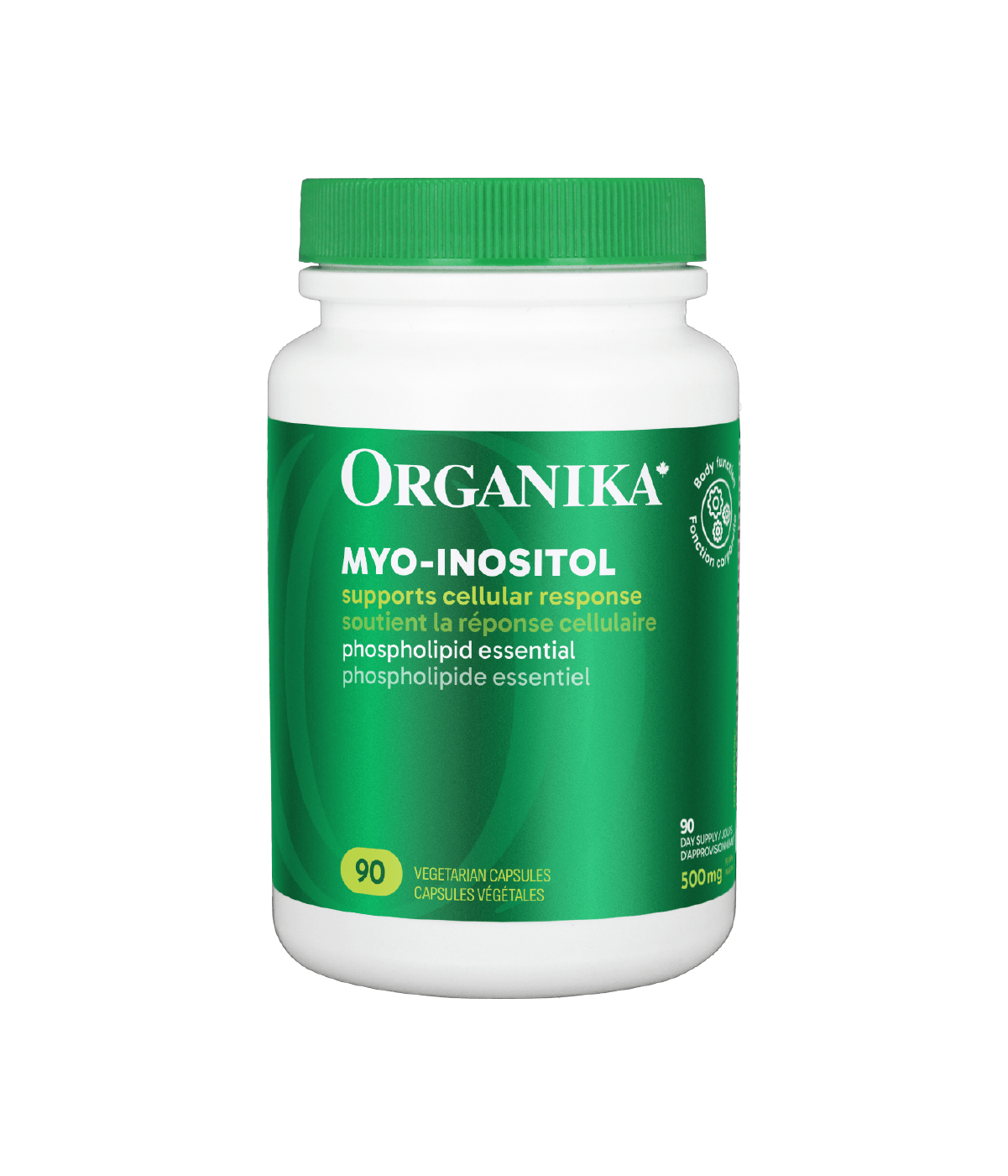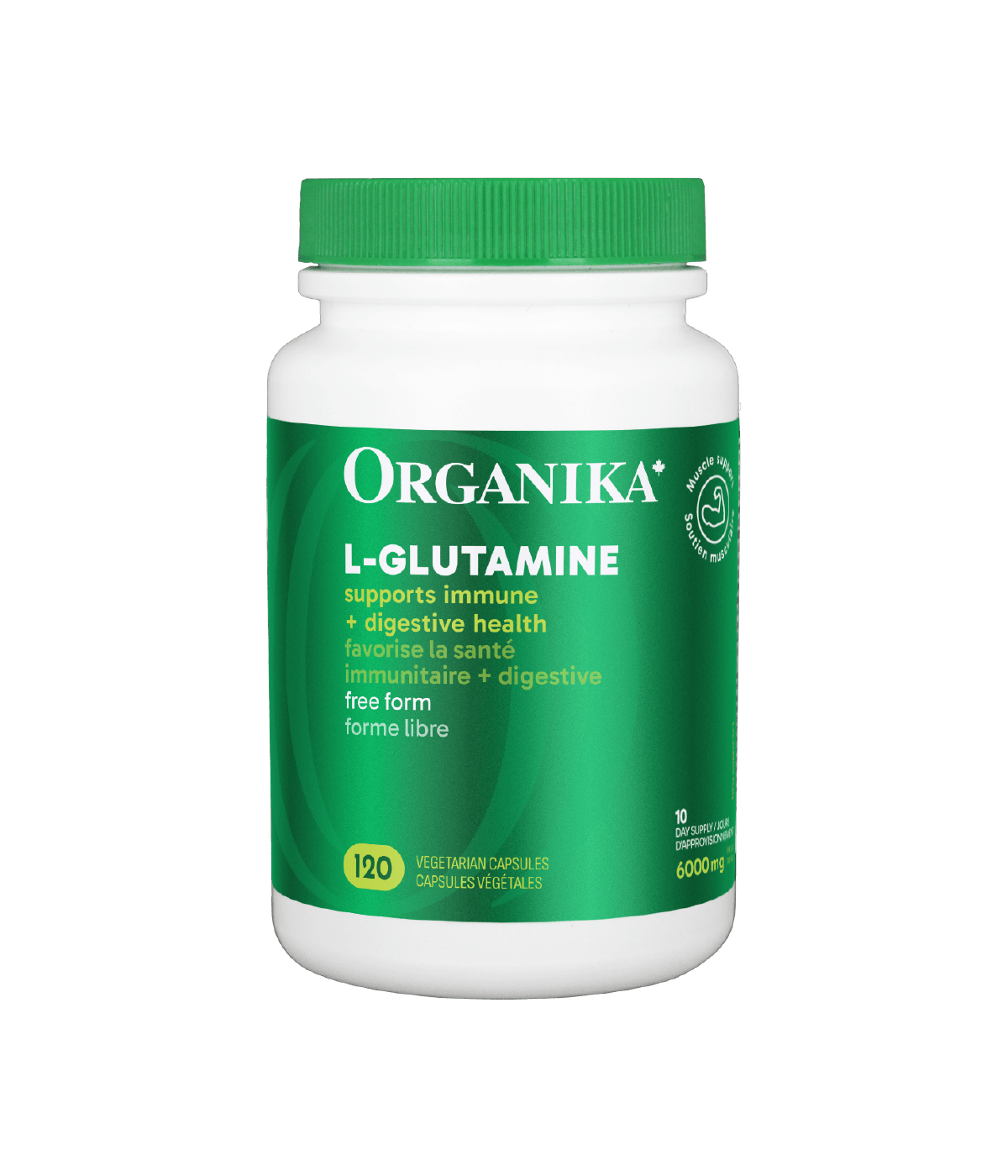
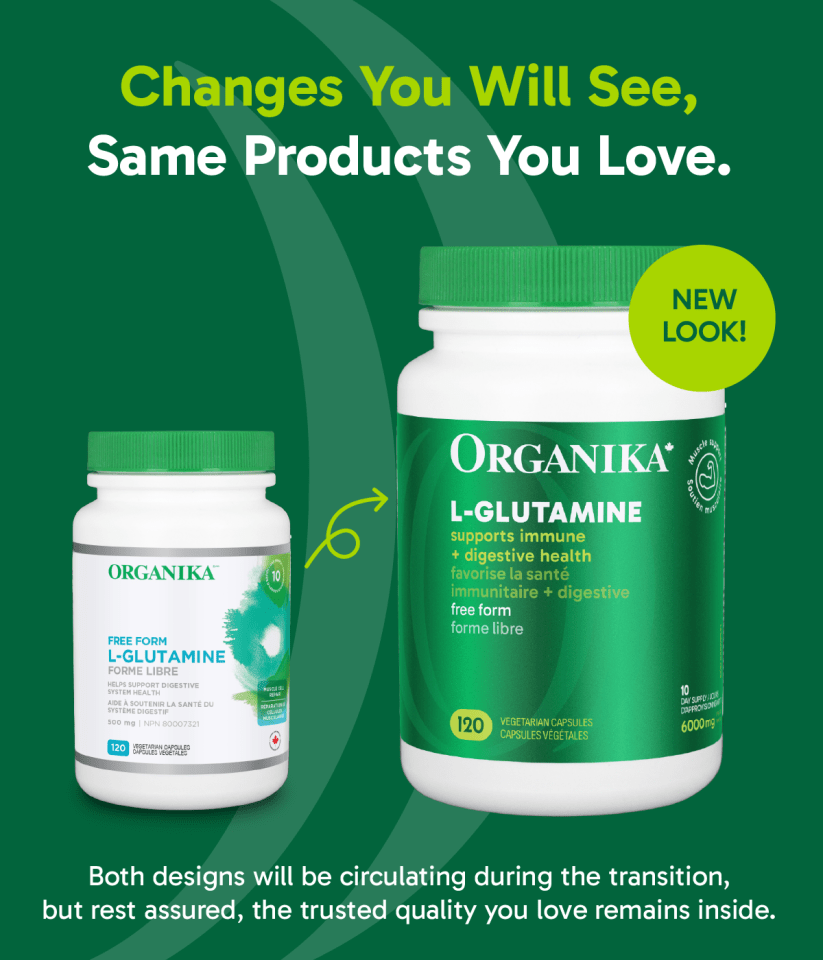
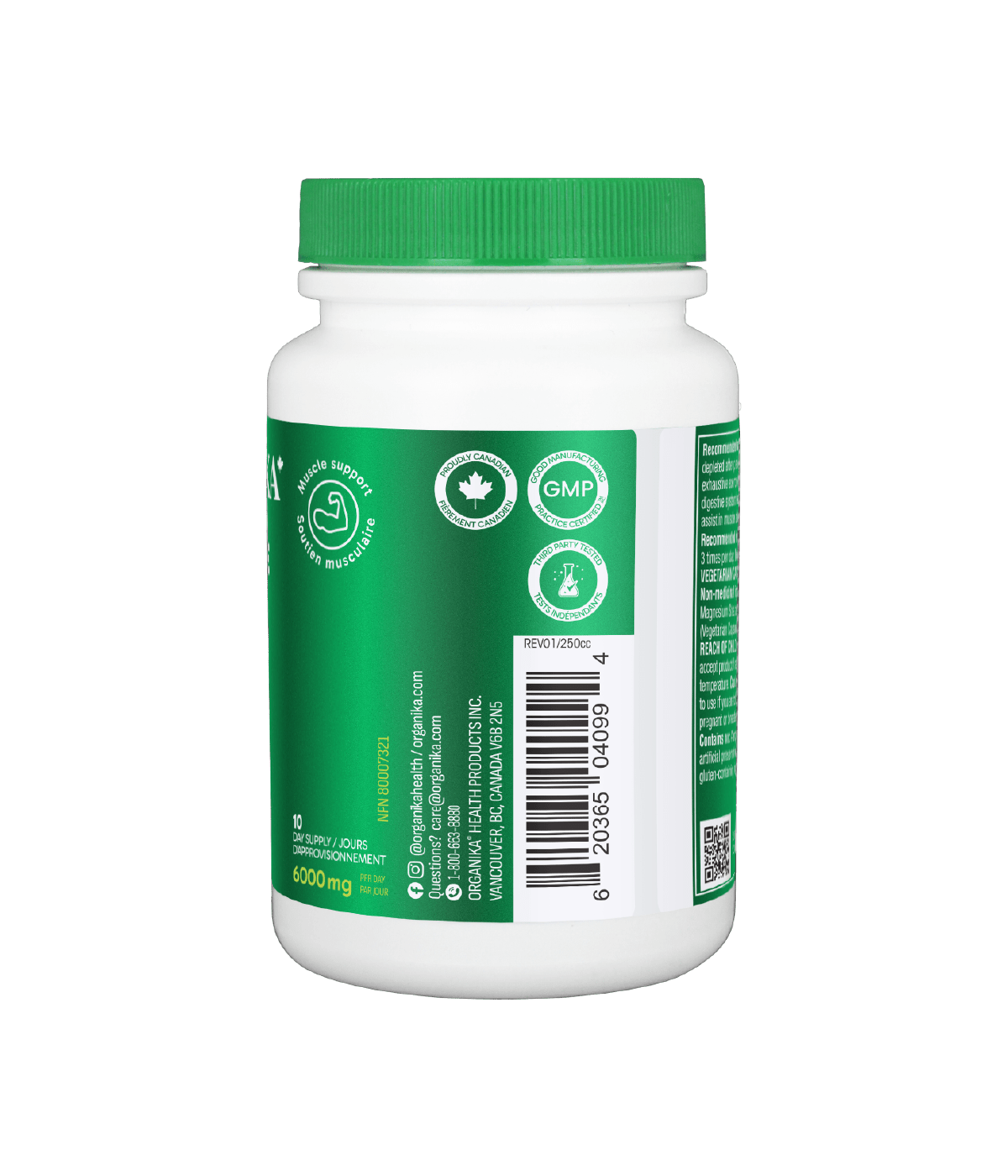
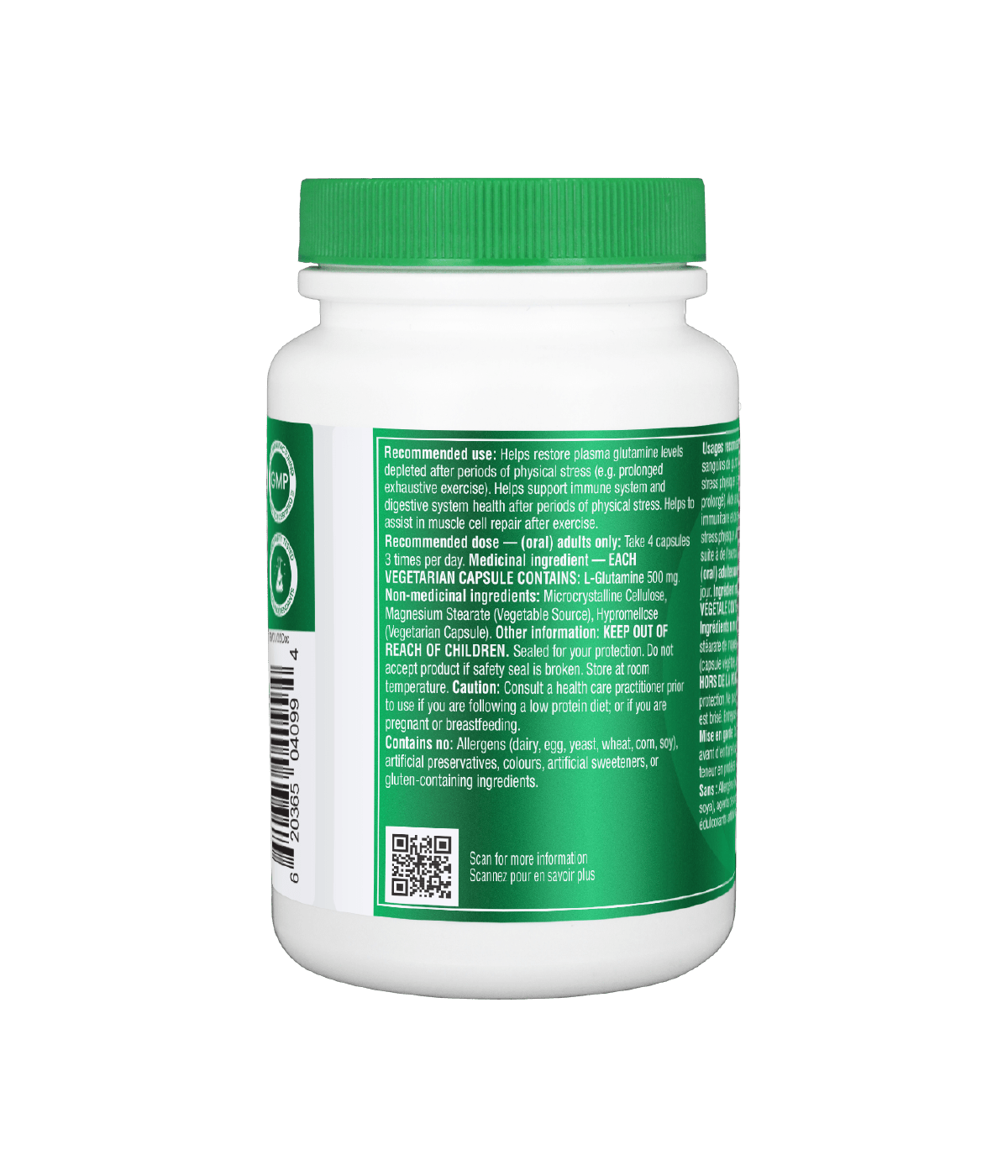
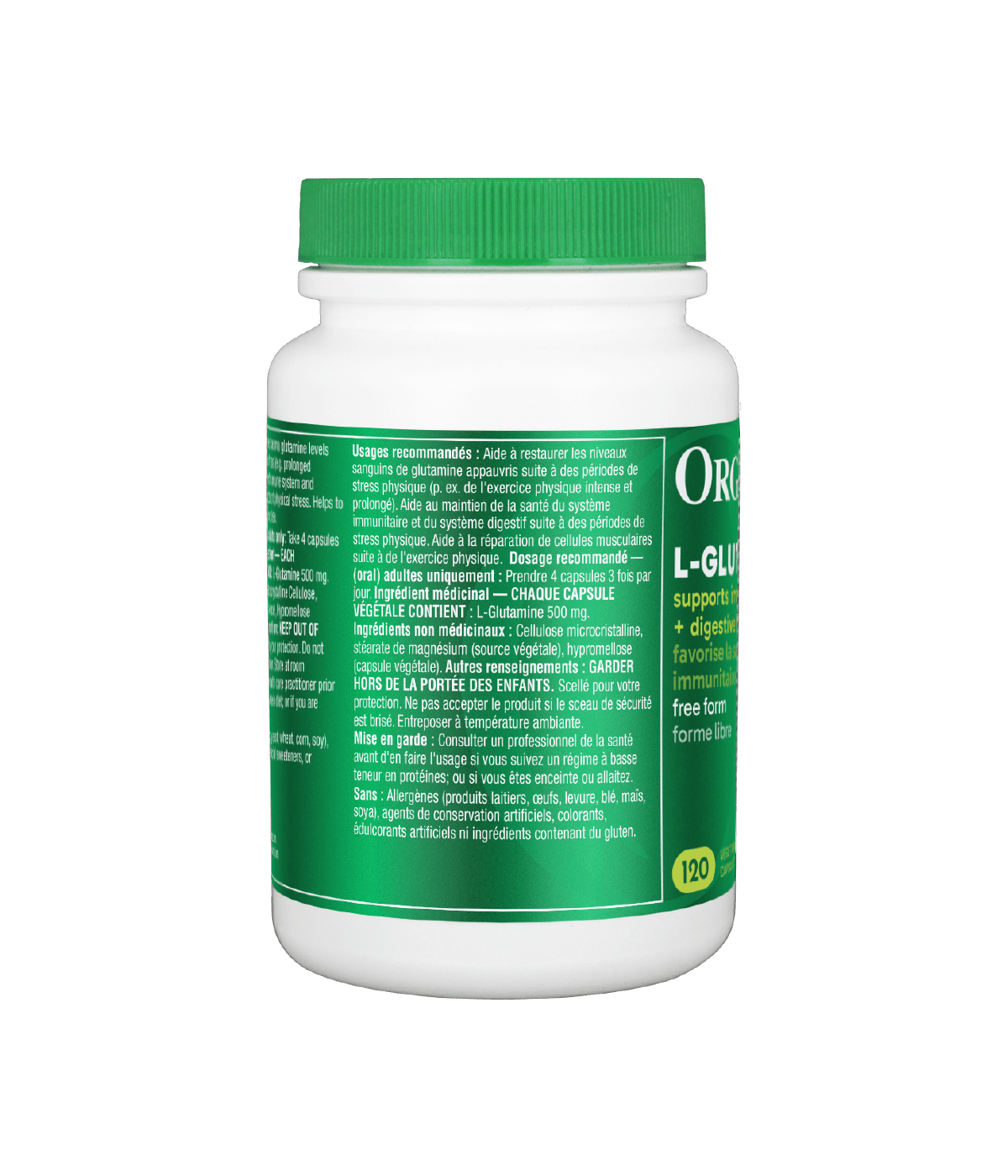




-
Is this right for you?

-


-


-

-

-

-

Free-Form L-Glutamine Capsules
Muscle, gut and immune support that fuels your recovery.
- Assists in muscle cell repair and recovery
- Supports immune system function, especially during times of stress
- Helps maintain the integrity of the gut lining for better digestive health
- Capsule form for ease-of-use
Couldn't load pickup availability
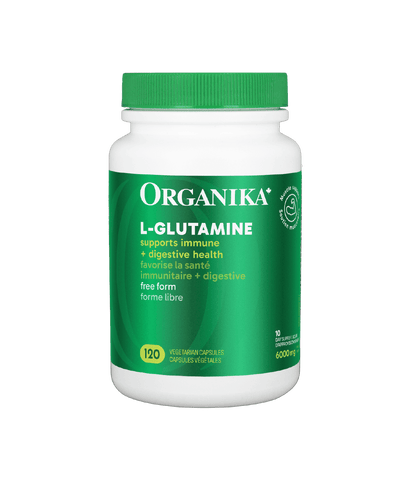
Notify Me When Available
Enter your email and we'll let you know as soon as this product is back
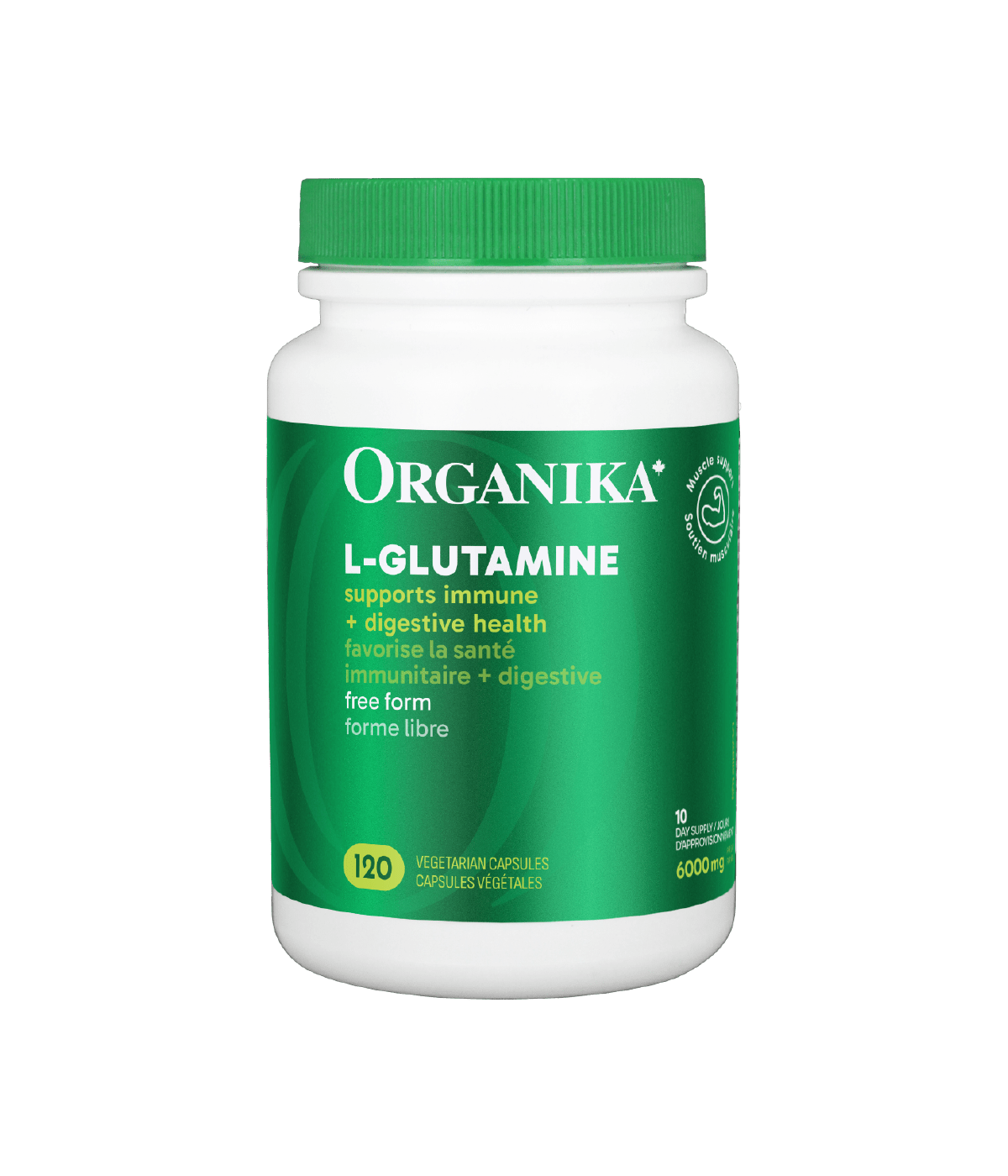
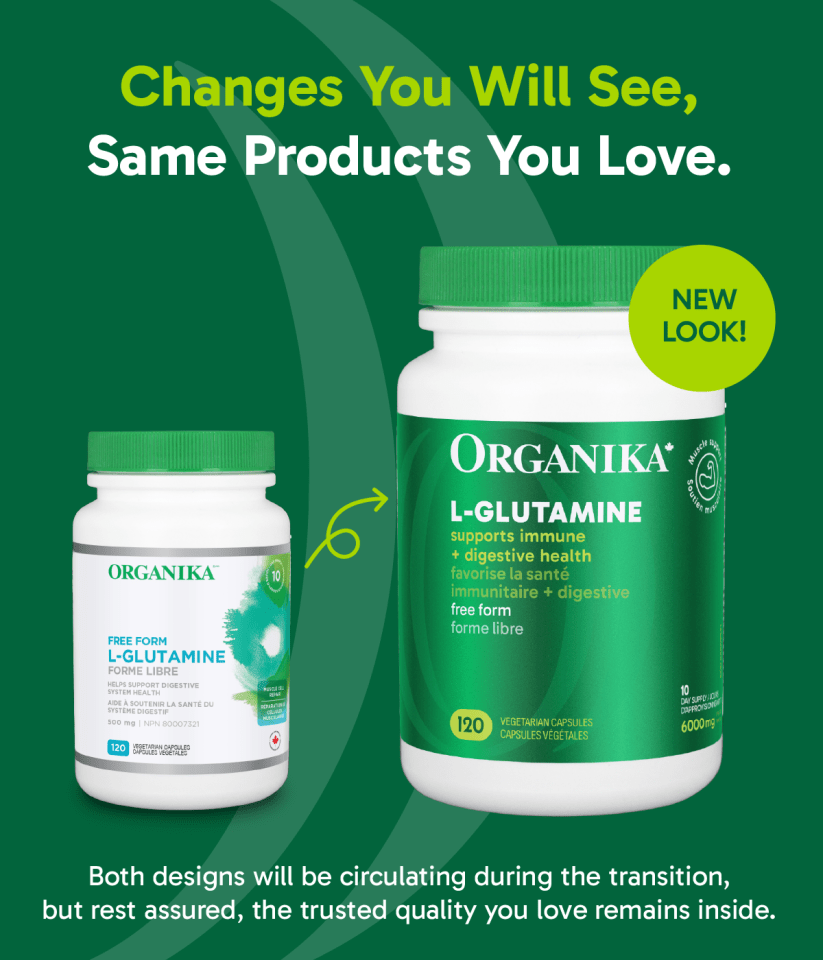
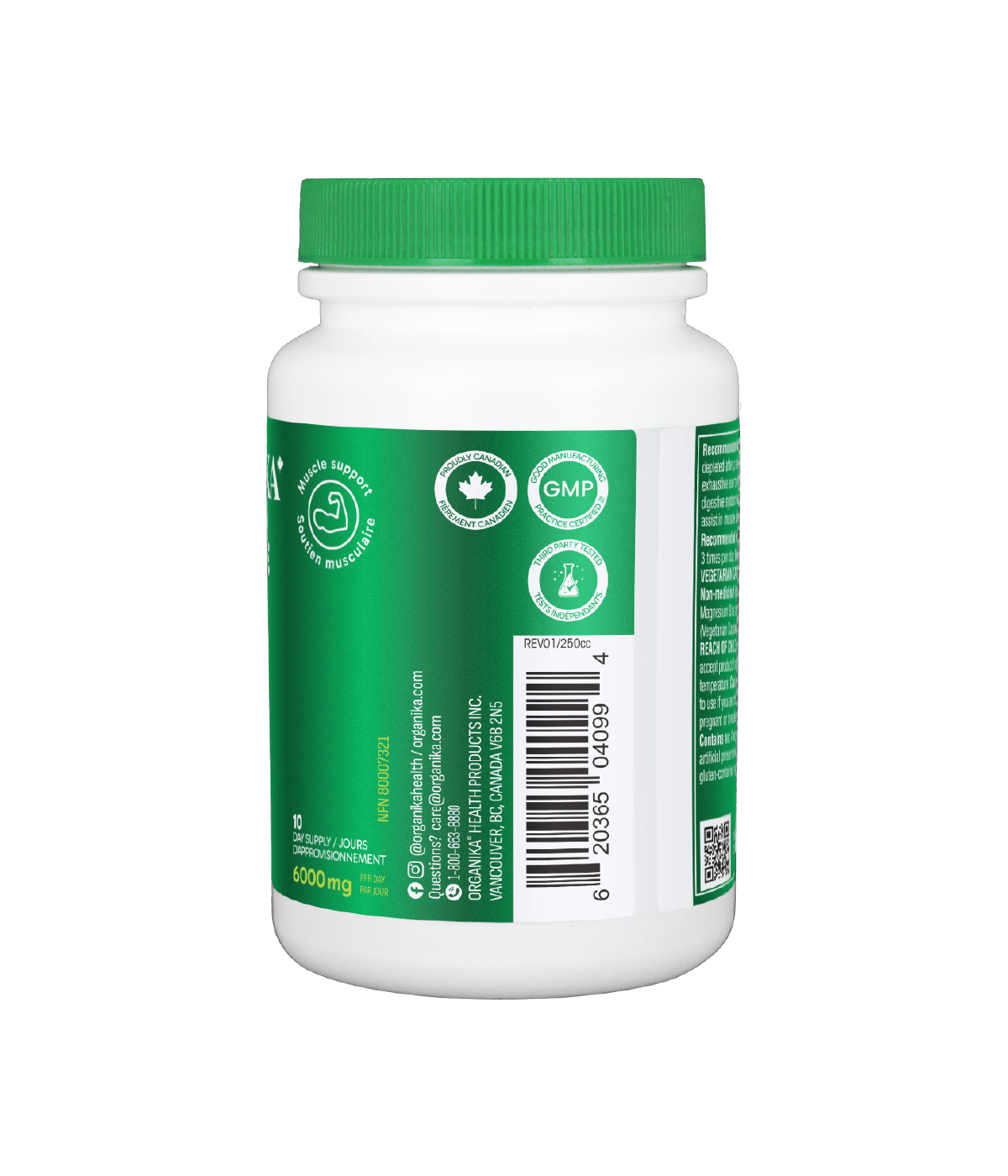
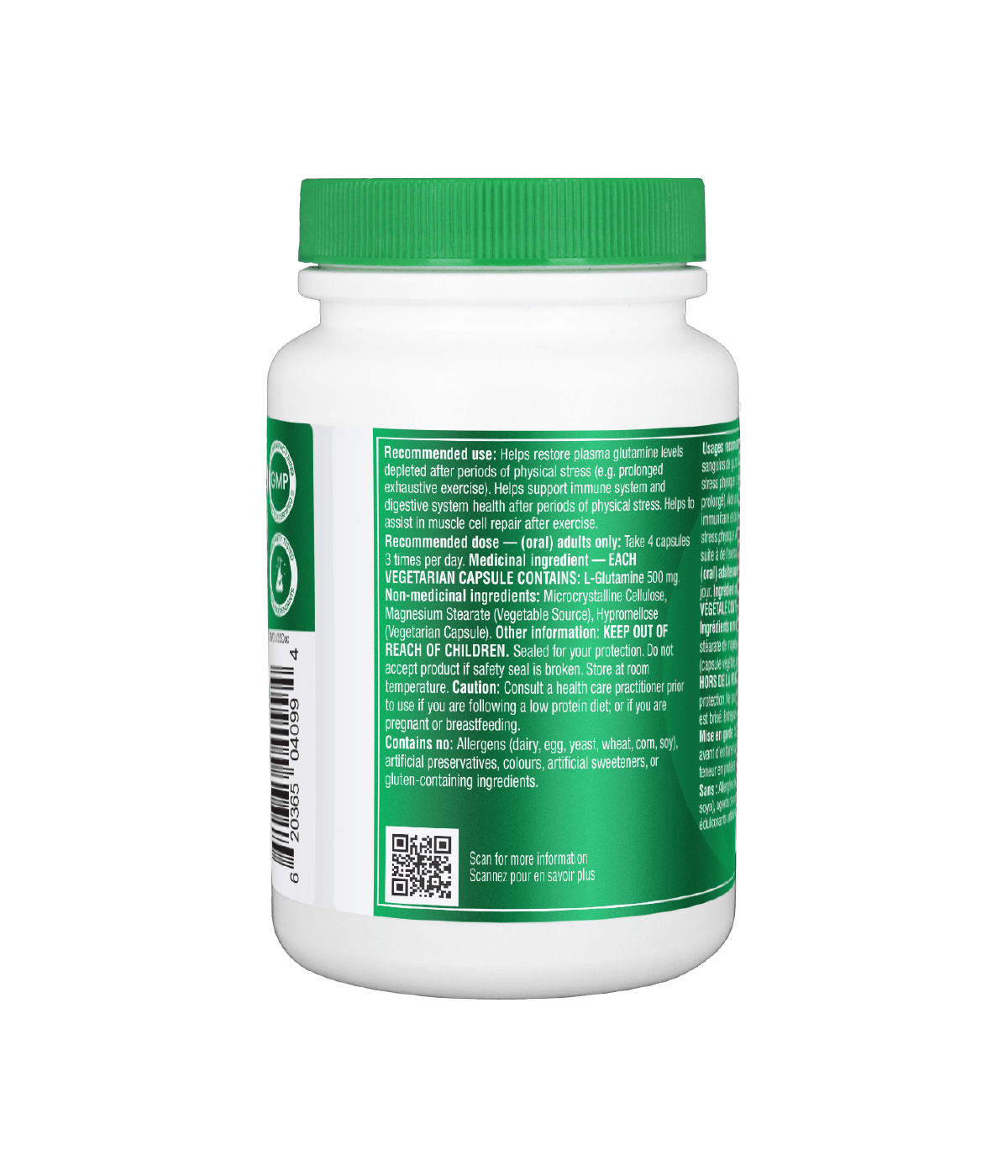
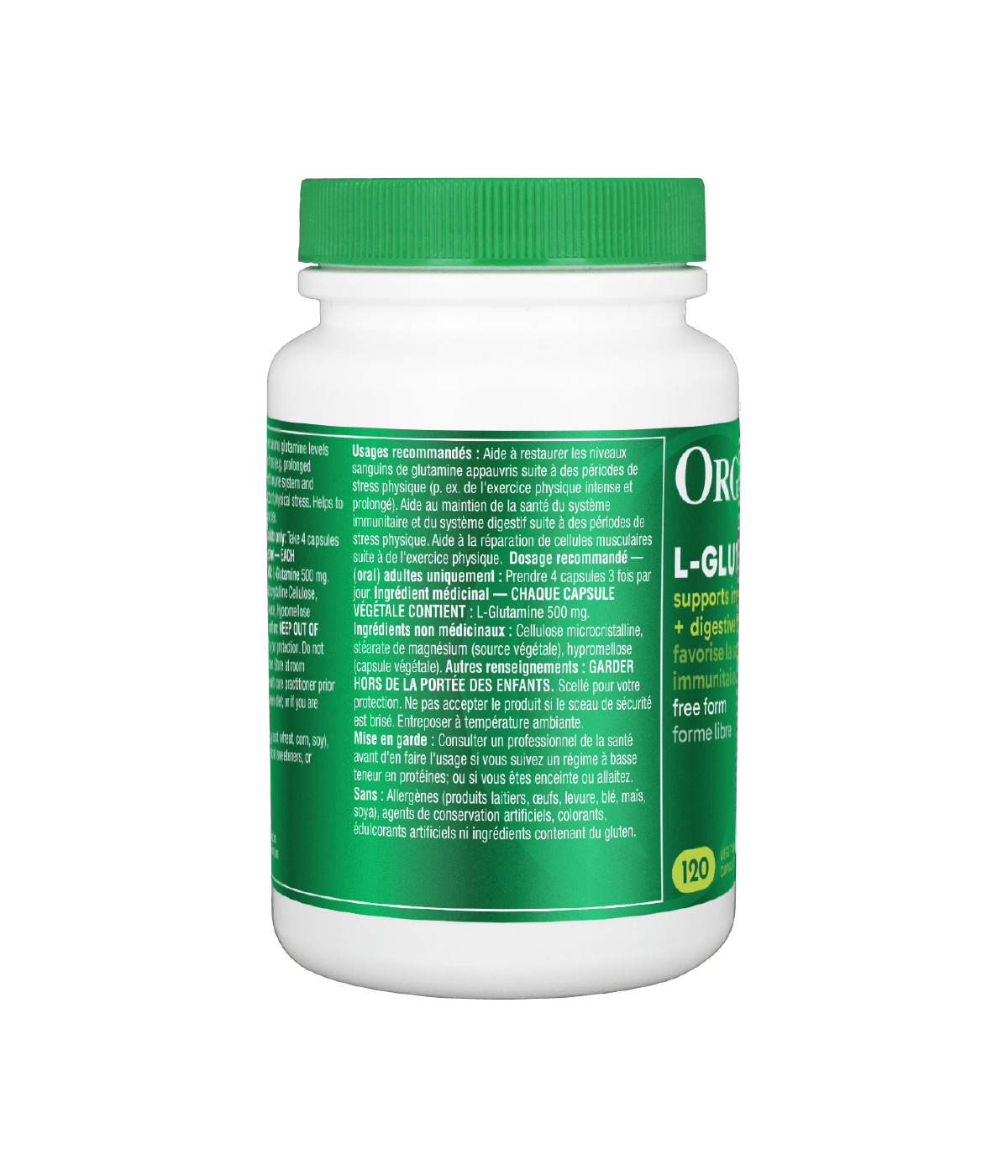





Supplement Facts
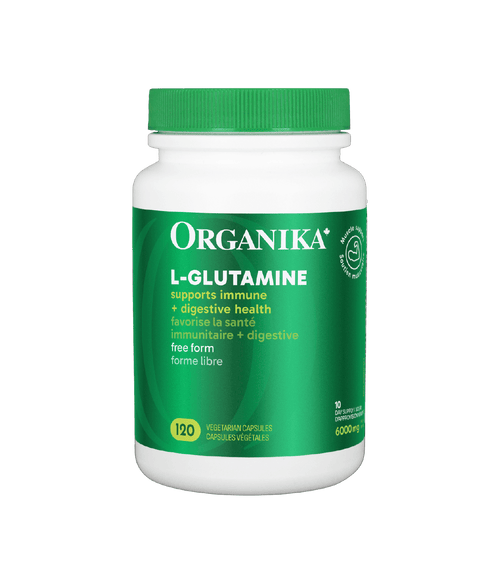
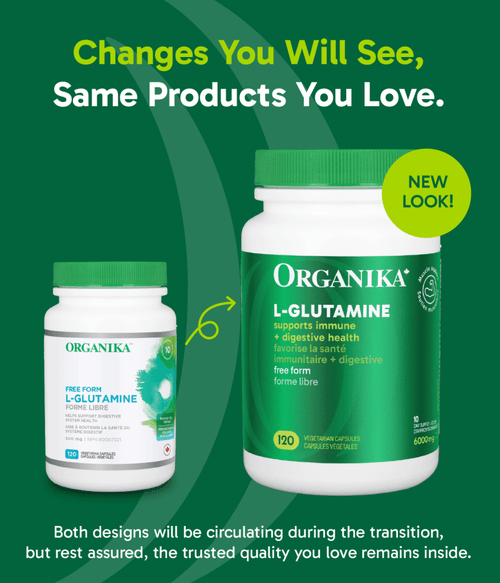
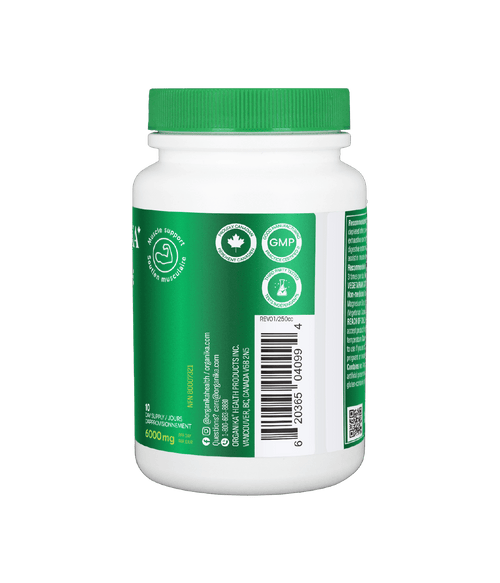
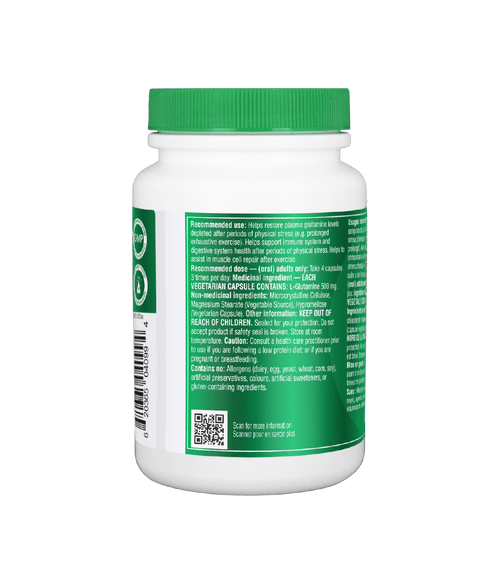
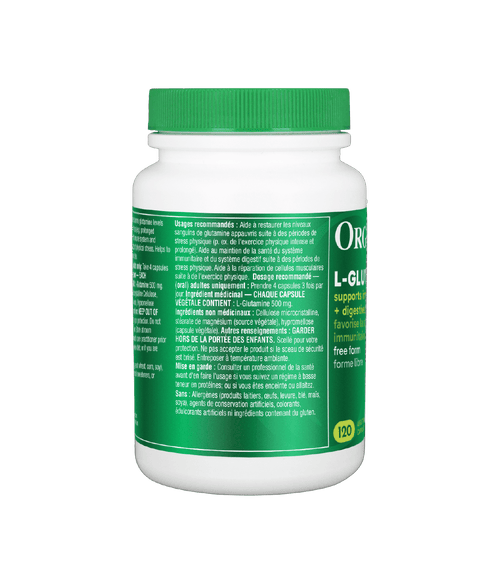
Ingredients & Nutrition
MEDICAL INGREDIENTS: L-Glutamine 500 mg.
NON-MEDICAL INGREDIENTS: Microcrystalline Cellulose, Magnesium Stearate (Non-GMO Vegetable Source), Hypromellose (Vegetarian Capsule).
How to Use: Take 4 capsules 3 times per day.
Is This Right for You?
Are you recovering from intense workouts and want to reduce soreness and speed up repair?
Do you experience digestive issues or want to support gut lining integrity?
Are you looking for a clean, easy-to-absorb way to replenish glutamine levels?
If you answered "Yes" to any of the above, this product is right for you.

-
Helps maintain the integrity of the gut lining for better digestive health
-
Capsule form for ease-of-use
Ingredients & Nutrition
Recommend For
Are you recovering from intense workouts and want to reduce soreness and speed up repair?
Do you experience digestive issues or want to support gut lining integrity?
Are you looking for a clean, easy-to-absorb way to replenish glutamine levels?
If you answered "Yes" to any of the above, this product is right for you.
Sans gluten
Compatible avec le régime cétonique
Non-OGM
Compatible avec les végétariens
No Artificial Sweeteners
No Artificial Colours or Flavours
Helps replenish what your body loses under stress and supports muscle recovery, gut integrity and immune resilience during periods of intense activity


The Full Scoop

-
Helps maintain the integrity of the gut lining for better digestive health
-
Capsule form for ease-of-use
When your bodyís under pressure from intense training, illness, or everyday stress, it draws heavily on glutamine, the amino acid that fuels muscle repair and strengthens immune defences. During high-demand moments, your natural supply can run low. These Free-Form L-Glutamine Capsules deliver targeted support to help:
- Rebuild sore, strained muscles after workouts
- Restore gut lining integrity for better digestion and nutrient absorption
- Replenish glutamine levels to support immune resilience when you're worn down
L-Glutamine is foundational fuel for keeping your body strong and resilient and an ideal supplement to support long gym sessions, physical recovery and gut repair.
Ask Away
We’ve got the FAQs covered. But if you’re still stuck, we’re only a message away.
Get in TouchWhat is the primary purpose of this product?
The primary purpose of L-Glutamine is to support muscle recovery and immune function.
How should adults take this L-Glutamine supplement?
This supplement can be taken after physical activity or throughout the day.
Is there a specific caution associated with the use of this supplement?
Consult a healthcare provider or professional prior to use if you are pregnant or breastfeeding.
Can this product be taken with or without food?
L-Glutamine can be taken with or without food.
Can this supplement be taken in combination with other dietary supplements or medications?
It's generally safe to consume L-Glutamine with other dietary supplements or medications, however consulting a healthcare provider or professional is recommended to avoid potential interactions.
How quickly should one expect to see the benefits of taking L-Glutamine?
One may start noticing benefits from taking L-Glutamine within a few days to a few weeks of consistent use.
Can individuals on a low protein diet use this supplement?
Individuals on a low protein diet should consult a healthcare pofessional before using this supplement.
Is there a suggested duration of use for this L-Glutamine supplement?
The suggested duration of use for L-Glutamine supplements can vary depending on individual health goals and specific circumstances. It's best to consult with a healthcare professional or follow the recommendations provided on the product label for guidance on duration of use.
Can pregnant or breastfeeding individuals use this product?
It's best to consult with a healthcare provider or professional if you are pregnant or breastfeeding.
You'll Likely Also Love...
Capsules de NAC (N-Acétyl-L-Cystéine)
The foundation of cellular defence
Quercétine avec broméline
The natural compounds that elevate your recovery through plant-based support
Inositol
Support for healthy hormone & mood balance, and ovarian function in females
Spirulina + B12
Essential vitamin involved in metabolism, energy and healthy hormone levels
Support Beyond Products
What you need to know about collagen’s role in muscle mass. You may have heard that collagen is the most abundant protein in the human body and is a key component of all connective and fibrous tissue, including muscle, bone, cartilage, tendons, ligaments, blood vessels, hair, and skin (1). Collagen is vital for muscle health, because it accounts for up to 10% of the total mass of skeletal muscle tissue in the body (2). Because working out involves increasing muscle mass, let’s explore why collagen becomes important. Does collagen play a role in exercise? We have long understood that exercise causes stress and micro-trauma to working muscles and connective tissue (tendons, ligaments, fascia, etc.). The higher intensity the exercise, the higher the impact on the muscles. This micro-trauma is necessary and valuable; it is the primary driver that directs the body to build more muscle mass and to increase strength. However, repair of micro-trauma, and increasing muscle mass and strength is only possible if the correct protein and amino acid building blocks are available in adequate amounts. Extensive research has shown that ensuring adequate protein intake has a large positive impact on muscle repair and growth (3). What amino acids do you need for muscle growth? The essential amino acids most required for muscle growth and repair are leucine, isoleucine, valine and glutamine, all of which are found in all animal sources of collagen (4). As a great animal-based source of protein, collagen is a helpful addition to an athlete’s diet. Research comparing the use of animal and plant-based sources of protein in athletes has shown that equivalent amounts of a carbohydrate or soy-based protein supplement does not have as marked of an impact as animal-based protein on post-workout muscle building (5). Collagen is also high in the amino acids proline and glycine, which are particularly important for the strengthening and repair of tendons and ligaments. They may also help decrease the likelihood of exercise-induced injury (3). Collagen increases muscle with training. The research has found that collagen peptide supplementation in combination with resistance training has helped body composition by both increasing muscle strength and the loss in fat mass (7)(8). So whether you are working out for weight loss, or increasing muscle mass, supplementing with collagen can make a big difference than when just resistance training alone (9). How can I incorporate collagen into my post-workout routine? The standard daily protein requirements for most people are 1-1.5g/kg of body weight per day, although research shows increasing it up to 1.6-2.0g/kg per day can be beneficial in individuals doing more significant resistance training. It’s important to remember that many people, these days, are mindful of increasing their protein intake. When adequate daily protein is consumed, research shows that a moderate post-workout dose of protein is sufficient to promote muscle repair. Studies vary, but the suggested dose is between 6 and 20g of protein, taken 1-3 hours post workout (6). NOTE: You don’t need to be a high-level athlete in order to benefit from collagen supplementation. Organika's Enhanced Collagen Original or a Plant-Based Collagen Booster are excellent sources of amino acids. When used in combination with a whole foods diet including high quality protein, collagen is useful for anyone who is trying to build muscle, enhance their recovery and prevent injury. Dr. Jessica Eastman is a licensed and registered Naturopathic Doctor in clinical practice in Vancouver BC, an experienced faculty member at the Institute of Holistic Nutrition, and the founder of Thrive Clinical Mentorship. Jessica strongly believes in integrative medicine and the value of a supportive community where patients, clients and clinicians can work together. REFERENCES Sibilla, S., Godfrey, M., Brewer, S., Budh-Raja, A., & Genovese, L. (2015). An overview of the beneficial effects of hydrolysed collagen as a nutraceutical on skin properties: Scientific background and clinical studies. The Open Nutraceuticals Journal, 8(1), 29-42. Gillies, A., Lieber, R. (2011). Structure and function of the skeletal muscle extracellular matrix. Muscle Nerve, 44(3): 318-331. Wells, D. (2009). The post-workout protein puzzle: which protein packs the most punch? Strength and Conditioning Journal, 31(1): 27-30. Gauza-Wiodarczyk, M., Kubisz, L., Wiodarczyk, D. (2017). Amino acid composition in determination of collagen origin and assessment of physical factors effects. International Journal of Biological Macromolecules, 104(Pt A):987-991. Philips, S. (2011). The science of muscle hypertrophy: making dietary protein count. Proceedings of the Nutrition Society, 70(1): 100-103. Schoenfeld, BJ., Aragon, AA., Krieger, JW. (2013). The effect of protein timing on muscle strength and hypertrophy. Journal of the International Society of Sports Nutrition, 10(53). Zdzieblik D, Oesser S, Baumstark MW, Gollhofer A, König D. Collagen peptide supplementation in combination with resistance training improves body composition and increases muscle strength in elderly sarcopenic men: a randomised controlled trial. Br J Nutr. 2015 Oct 28;114(8):1237-45. Kirmse M, Oertzen-Hagemann V, de Marées M, Bloch W, Platen P. Prolonged Collagen Peptide Supplementation and Resistance Exercise Training Affects Body Composition in Recreationally Active Men. Nutrients. 2019 May 23;11(5):1154. Oertzen-Hagemann V, Kirmse M, Eggers B, Pfeiffer K, Marcus K, de Marées M, Platen P. Effects of 12 Weeks of Hypertrophy Resistance Exercise Training Combined with Collagen Peptide Supplementation on the Skeletal Muscle Proteome in Recreationally Active Men. Nutrients. 2019 May 14;11(5):1072.
read moreDes conseils pour garder votre tube digestif heureux. "Vous êtes ce que vous mangez et ce que vous digérez". Une grande partie de la santé intestinale est liée à ce que vous mettez dans votre corps. On peut dire que la façon dont vous digérez les aliments que vous mangez est absorbée au niveau de l'intestin. Il est important de prendre soin de votre intestin en lui fournissant des aliments et des compléments alimentaires nourrissants et curatifs. Nous avons demandé à nos nutritionnistes holistiques agréés de nous donner leur avis sur la façon d'améliorer la santé intestinale et de la préserver. Une alimentation riche en fibres et en probiotiques Les fibres sont des glucides d'origine végétale (ne paniquez pas devant ce mot) qui contribuent à réduire le risque de nombreuses maladies du cœur, du système digestif et autres. Les deux types (soluble et insoluble) sont bénéfiques. Ils stimulent la croissance de bactéries intestinales saines, contribuent à ralentir l'absorption du glucose et aident à éliminer les déchets de l'organisme. Les probiotiques sont des bactéries intestinales saines que l'on trouve dans les aliments fermentés comme le yaourt, le kimchi et le kombucha. Les probiotiques contribuent à la bonne santé de l'intestin en fournissant les bactéries bénéfiques qui aident à maintenir le calme et l'équilibre. Des bactéries intestinales saines sont liées à une diminution de l'inflammation, de l'irritabilité et des problèmes digestifs. Pour en savoir plus sur la protection de votre microbiome, cliquez ici. On peut affirmer sans risque de se tromper qu'une alimentation comprenant des légumes racines, des fruits, des légumes à feuilles vertes, des céréales complètes (si vous en consommez) et des aliments fermentés contribuera à améliorer votre intestin. Prenez des suppléments de soutien à la santé intestinale Collagène et bouillon d'os Le collagène contient des acides aminés qui favorisent la santé intestinale en réduisant l'inflammation et en guérissant l'intestin lui-même. Il a été démontré que le collagène bovin est particulièrement utile pour la santé intestinale. Vous pouvez également aller au-delà du collagène et prendre du bouillon d'os. Le bouillon d'os comprend du collagène, de la gélatine ainsi que d'autres ingrédients qui peuvent contribuer à la guérison des tissus et calmer l'inflammation de la paroi intestinale. La gélatine est essentiellement la version cuite du collagène. Ils fournissent tous deux les mêmes acides aminés et procurent les mêmes avantages. Vous voulez avoir les deux ? Full Spectrum Collagen 1,2,3 combine à la fois le collagène et le bouillon d'os ! Probiotiques Nous avons parlé du rôle essentiel que jouent les probiotiques dans la santé intestinale. Pour être sûr de consommer les bactéries intestinales dont votre corps a besoin, il est souvent suggéré de prendre des suppléments de probiotiques quotidiennement. En les fournissant quotidiennement à votre intestin, vous permettrez au système digestif de se préparer. Probiotiques + Prébiotiques est une combinaison gagnante, car elle fournit non seulement la flore intestinale bénéfique, mais aussi de la nourriture pour que les bactéries bénéfiques (prébiotiques) se développent. Enzymes La santé intestinale repose en partie sur la capacité à digérer les aliments que vous mangez. Si vous vous sentez léthargique ou ballonné, vous pouvez prendre des enzymes digestives qui accélèrent la décomposition des glucides, des protéines et des graisses. Les enzymes végétales à spectre complet favorisent la digestion, ce qui contribue à la santé intestinale. Bougez votre corps Faire de l'exercice quotidiennement vous aidera à renforcer la santé de vos intestins. Comment ? Essentiellement, les muscles impliqués dans la digestion se renforcent avec l'exercice, ce qui favorise le péristaltisme (déplacement des aliments digérés dans l'intestin). L'exercice joue également un rôle dans la promotion de bactéries saines dans l'intestin (dont nous avons toujours besoin d'un bon équilibre). En fait, des études ont suggéré que l'exercice a le potentiel de modifier la flore intestinale et de favoriser le bien-être. Cela fait littéralement du bien de bouger ! Limitez votre consommation d'alcool et de café Les bactéries de l'intestin n'apprécient pas particulièrement une forte consommation d'alcool. Une consommation excessive d'alcool peut entraîner des troubles digestifs, mais aussi une inflammation de la paroi intestinale. Lorsque cela se produit, l'intestin devient sensible aux malaises, aux ulcères et même aux infections. Pour la même raison, si vous avez l'impression d'avoir l'estomac dérangé après avoir consommé de la caféine, envisagez de réduire la quantité à une ou deux tasses par jour. Diminuez le stress Un conseil courant pour la santé en général, mais surtout le stress a un effet négatif sur la santé intestinale. Des études ont montré qu'il existe des liens entre l'anxiété et la dépression et les problèmes intestinaux, et vice versa. C'est pourquoi vous pouvez ressentir des maux d'estomac après une série d'événements stressants ; le lien entre l'esprit et l'intestin est tout à fait synchrone. Travaillez à calmer l'esprit et le corps, ou envisagez un soutien au stress, tel que le Collagène amélioré Relax. C'est un excellent complément à ajouter à une boisson ou à de l'eau après une journée stressante. Le collagène amélioré relaxe en douceur, sans somnolence, car il contient du collagène, du bisglycinate de magnésium et de la L-théanine (suppléments de soutien au stress et à la relaxation). Améliorer votre santé intestinale n'est pas forcément une tâche ardue. Prenez une bonne habitude à la fois et n'oubliez pas que la santé de tout votre corps commence par celle de vos intestins.
read moreLearn about the best supplements to support your joints and combat joint pain Joint pain can prevent you from doing things you love, an agonizing menace in your body often associated with arthritic pain. There's natural solutions that can provide relief and support. What is joint pain? Joint pain is described as discomfort coming from any of your joints – but the cause may be coming from your cartilage, bones, ligaments, or muscles and tendons. In most cases, joint pain is due to inflammation, or the cartilage around the joint being worn down. Cartilage is the material that rests between bones and prevents them from rubbing together. Over time, the cartilage breaks down (age, certain activities, etc.). This can lead to osteoarthritis and a source of joint pain that can be debilitating at times. The best supplements to take for joint pain The most well-known supplements to support the joints, and help with pain or inflammation appear to be: Collagen Glucosamine Chondroitin MSM Collagen Fish Oil – Omega 3s Turmeric Boswellia All of these are naturally occurring supplements that have been used to treat, support or prevent joint pain. There is growing evidence that these supplements help a body that is either aging or active. Taking these supplements may help with prolonged activity, recovery, performance and simply increasing your quality of life. How does collagen support your joints? Collagen is a protein that is found in many parts of the body that gives you structure, including cartilage, joints, ligaments, and bones. Because collagen declines (the production of it and the amount you have) as you age... your joints can start to feel it. Collagen is necessary for joint health. Providing your body with collagen supplements can offset the effects of wear and tear and help to rebuild that joint health, especially in high-risk groups.¹¹ Collagen also provides support for both tissue and cartilage formation, which is important in repairing and restoring, especially after movement. It also decreases stiffness in the joints, which helps with mobility; this is important for exercise and recovery and everyday life. Stronger joint stability is also contributed to strong bones, as collagen helps the bone matrix as well. Reducing inflammation, joint pain and muscle pain There are three other supplements that are massively known to help with joint pain, and taken by athletes, those with osteoarthritis, and anyone experience joint discomfort: Glucosamine, Chondroitin, and MSM. Glucosamine Research indicates that glucosamine may reduce inflammation¹, especially when used with chondroitin.² Glucosamine supplements protect your joints from damage because it is involved in the healthy development of cartilage. ³ ⁴ Chondroitin Chondroitin sulfate is a popular supplement that people often use to help manage joint pain, specifically with osteoarthritis. It has been studied and found to help symptoms associated with joint degeneration when combined with glucosamine. ⁵ ⁶ Methylsulfonylmethane [MSM] MSM is also used to decrease joint and muscle pain and overall improve the quality of life. It has been studied to benefit those with joint degeneration pain in ages 50+⁷ as well as found to significantly reduce inflammation in your body. Furthermore, it has been found to inhibit breakdown of cartilage, so useful in prevention before getting to that stage of life.⁸ MSM is well studied to reduce arthritis symptoms⁹ as well as stiffness and pain related to prolonged exercise,¹⁰ proven to be a helpful supplement for pain. Combining the best supplements into one NEW! Enhanced Collagen™ Bone & Joint is the answer for all things joint health, joint pain, for the active and anyone with osteoarthritis. We have taken Canada's #1 Collagen Powder* and combined it with a synergistic blend of ingredients that works to prevent bone loss, joint degeneration, inflammation, and reduce joint pain. Enhanced Collagen Bone & Joint provides: 9g Collagen 1500mg Glucosamine 800mg Chondroitin 1500mg MSM As well as Vitamin D3 and K2 (for added bone support) This is the ultimate joint health support and great for: prolonged exercise recovery osteoarthritis and joint pain joint and cartilage protection Are there others that I should consider adding? There are a few other supplements that also work with joint health in specific ways. Fish Oil/Omega-3s Omega-3 fatty acids work specifically to combat inflammation in the body, including your joints. Your body uses it as blockers to remove joint stiffness or tender joints causing pain. Try: Krill Oil Turmeric This is the aromatic and golden spice found in curry. It is a compound in the curcumin spice which contains proteins that block inflammation in the body and help with pain. Over time, it can ease joint pain and help with mobility. Try: Turmeric+ Powder with Curcumin, Turmeric Mylk Latte, Chicken Bone Broth Powder with turmeric Boswellia Also referred to as “Indian frankincense”, this is an extract from a naturally occurring plant and been a part of both Asian and African traditional medicine for centuries. The active ingredient helps with pain in joints. It may also slow down cartilage loss. Try: Boswellia Curcumin This article has been fact checked. REFERENCES: 1 https://pubmed.ncbi.nlm.nih.gov/28586015/ Yamagishi Y, Someya A, Imai K, Nagao J, Nagaoka I. Evaluation of the anti-inflammatory actions of various functional food materials including glucosamine on synovial cells. Mol Med Rep. 2017 Aug;16(2):1353-1359. 2 https://pubmed.ncbi.nlm.nih.gov/25719429/ Navarro SL, White E, Kantor ED, Zhang Y, Rho J, Song X, Milne GL, Lampe PD, Lampe JW. Randomized trial of glucosamine and chondroitin supplementation on inflammation and oxidative stress biomarkers and plasma proteomics profiles in healthy humans. PLoS One. 2015 Feb 26;10(2):e0117534. 3 https://pubmed.ncbi.nlm.nih.gov/30940583/ Nagaoka I, Tsuruta A, Yoshimura M. Chondroprotective action of glucosamine, a chitosan monomer, on the joint health of athletes. Int J Biol Macromol. 2019 Jul 1;132:795-800. 4 https://pubmed.ncbi.nlm.nih.gov/27422331/ Correa D, Lietman SA. Articular cartilage repair: Current needs, methods and research directions. Semin Cell Dev Biol. 2017 Feb;62:67-77. 5 https://www.ncbi.nlm.nih.gov/pmc/articles/PMC5241539/ Vasiliadis HS, Tsikopoulos K. Glucosamine and chondroitin for the treatment of osteoarthritis. World J Orthop. 2017;8(1):1-11. Published 2017 Jan 18. doi:10.5312/wjo.v8.i1.1 6 https://pubmed.ncbi.nlm.nih.gov/25589511/ Hochberg MC, Martel-Pelletier J, Monfort J, Möller I, Castillo JR, Arden N, Berenbaum F, Blanco FJ, Conaghan PG, Doménech G, Henrotin Y, Pap T, Richette P, Sawitzke A, du Souich P, Pelletier JP; MOVES Investigation Group. Combined chondroitin sulfate and glucosamine for painful knee osteoarthritis: a multicentre, randomised, double-blind, non-inferiority trial versus celecoxib. Ann Rheum Dis. 2016 Jan;75(1):37-44. 7 https://www.ncbi.nlm.nih.gov/pmc/articles/PMC4502733/ Xu G, Zhou T, Gu Y, et al. Evaluation of the Effect of Mega MSM on Improving Joint Function in Populations Experiencing Joint Degeneration. Int J Biomed Sci. 2015;11(2):54-60. 8 https://pubmed.ncbi.nlm.nih.gov/23011466/ Ezaki J, Hashimoto M, Hosokawa Y, Ishimi Y. Assessment of safety and efficacy of methylsulfonylmethane on bone and knee joints in osteoarthritis animal model. J Bone Miner Metab. 2013 Jan;31(1):16-25. 9 https://pubmed.ncbi.nlm.nih.gov/21708034/ Debbi EM, Agar G, Fichman G, Ziv YB, Kardosh R, Halperin N, Elbaz A, Beer Y, Debi R. Efficacy of methylsulfonylmethane supplementation on osteoarthritis of the knee: a randomized controlled study. BMC Complement Altern Med. 2011 Jun 27;11:50. 10 https://faseb.onlinelibrary.wiley.com/doi/abs/10.1096/fasebj.27.1_supplement.1076.7 A Randomized Double Blind Placebo Controlled Evaluation of MSM for Exercise Induced Discomfort/Pain. - Kalman - 2013 - The FASEB Journal - Wiley Online Library 11 1 24-Week study on the use of collagen hydrolysate as a dietary supplement in athletes with activity-related joint pain - PubMed (nih.gov) Clark KL, Sebastianelli W, Flechsenhar KR, Aukermann DF, Meza F, Millard RL, Deitch JR, Sherbondy PS, Albert A. 24-Week study on the use of collagen hydrolysate as a dietary supplement in athletes with activity-related joint pain. Curr Med Res Opin. 2008 May;24(5):1485-96.
read more






